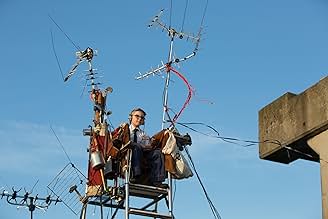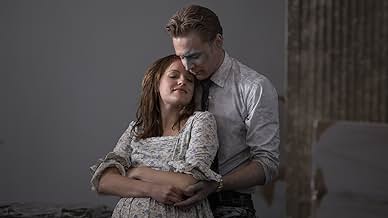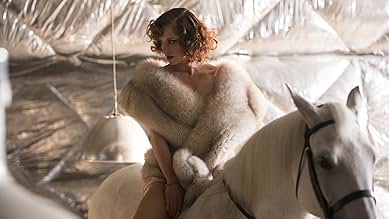Life for the residents of a tower block begins to run out of control.Life for the residents of a tower block begins to run out of control.Life for the residents of a tower block begins to run out of control.
- Awards
- 6 wins & 14 nominations total
Dan Renton Skinner
- Simmons
- (as Dan Skinner)
- Director
- Writers
- All cast & crew
- Production, box office & more at IMDbPro
Featured reviews
This isn't one film to take at face value. Very subversive, the film begins with our familiar face of Tom Hiddleston covered in blood in some apartment flat! We then rewind to 3 months back to explain what has happened. Based in some 1970s high-rise block (very 2000AD style), this building was designed as a utopia with the wealthiest settling in the top flats. Instead it turns in a dystopia, as the residents are stuck in some narcissistic and parochial void.
Civil & class war is breaking out and nothing is clear cut. Tom Hiddleston's character though is dressed and fitted as if he is from 20-30 years later, so it's too obvious a way for us to relate to him. Anyhow, he has to survive in this world, but gets sucked in.
This film reminded me of some 'horror' videos from the 1990's, wasn't uncommon in those days (films like 'Society' etc), and it was an interesting change. We have a very surreal look here in this film, and it's clichéd in style & outlook for the 1970's (which reflects the vanity of the residents).
Despite the originality, it didn't work for me. It's probably 30mins too long and that saps the interest out of it as they stretched the film. Too often you can't follow what is going on. You never empathise with anyone in this film as they try to live in their own vacuous worlds.
It's an interesting film but it definitely will only appeal to a minority, as I guess it was always going to looking at the premise. A minor cult film? Possibly. Won't be one I'll revisit.
Civil & class war is breaking out and nothing is clear cut. Tom Hiddleston's character though is dressed and fitted as if he is from 20-30 years later, so it's too obvious a way for us to relate to him. Anyhow, he has to survive in this world, but gets sucked in.
This film reminded me of some 'horror' videos from the 1990's, wasn't uncommon in those days (films like 'Society' etc), and it was an interesting change. We have a very surreal look here in this film, and it's clichéd in style & outlook for the 1970's (which reflects the vanity of the residents).
Despite the originality, it didn't work for me. It's probably 30mins too long and that saps the interest out of it as they stretched the film. Too often you can't follow what is going on. You never empathise with anyone in this film as they try to live in their own vacuous worlds.
It's an interesting film but it definitely will only appeal to a minority, as I guess it was always going to looking at the premise. A minor cult film? Possibly. Won't be one I'll revisit.
Life for the residents of a tower begins to run out of control.
High-Rise is the adaptation of J.G. Ballard's 1975 novel, directed by Ben Wheatley and starring Tom Hiddleston as Dr. Robert Laing. I didn't really know what to expect from this movie, as I did not read the book, so I came at it from a fresh perspective. This film is a quasi-period piece, which is not completely irrelevant to a Britain in which buy-to-let apartment block exist. It is a blank, affectless world with a certain type of sci-fi and satirical Englishness. This tale is quite a bizarre, sleek, seedy and mad spectacle.
If Jeremy Iron's roles in Dead Ringer and M.Butterfly provide a roundabout link to Cronenberg, so does a med-school scene where the skin of a cadaver's head is peeled away in a kind of metaphor for society's thin surface. That and his wife parading around like some postmodern Marie Antoinette, on a horse. In fact, the core cast is brilliant. Tom Hiddleston is terrifically nonchalant, giving a great performance as the lead character: dry and self-possessed. A charming and charismatic performance with a hint of internal sadness. Plus, Miller makes bright work of Charlotte.
Mark Tildesley's lavish production design ranges from mouldering fruit bowls to posh parties decadent enough to cause a French Revolution. Decadence, despair and violence are all around, in a kind of ongoing erotic catastrophe. The screenwriters played out this scenario as a retro-futuristic sci-fi allegory - Ballard was writing the near-future in the mid-70s: Wheatley and Jump smartly stick with a period they know well. I loved the film's refusal of "normal" storytelling, bold visual style with these gorgeous shots and vibrant colours. Combined with the editing, shots have a dream- like surreal quality, a colourful beginning contrasted by the end with a dark shadow feeling.
The soundtrack was great, there is two scenes especially where there's this string quartet playing an ABBA song and later on it gets remix, it was probably one of my favourite scenes - as well as this very interesting naked scene on the balcony that might also be of some interest to some of you. Finally, for some High-Rise could be frustrating and the specific references to Margaret Thatcher era doesn't quite work as a whole.
Overall, High-Rise has a vibe of "you want to look away but you really can't". This film is an excellent allegory for society, it lingers in the mind with some strong visuals, good soundtrack and more than decent acting.
High-Rise is the adaptation of J.G. Ballard's 1975 novel, directed by Ben Wheatley and starring Tom Hiddleston as Dr. Robert Laing. I didn't really know what to expect from this movie, as I did not read the book, so I came at it from a fresh perspective. This film is a quasi-period piece, which is not completely irrelevant to a Britain in which buy-to-let apartment block exist. It is a blank, affectless world with a certain type of sci-fi and satirical Englishness. This tale is quite a bizarre, sleek, seedy and mad spectacle.
If Jeremy Iron's roles in Dead Ringer and M.Butterfly provide a roundabout link to Cronenberg, so does a med-school scene where the skin of a cadaver's head is peeled away in a kind of metaphor for society's thin surface. That and his wife parading around like some postmodern Marie Antoinette, on a horse. In fact, the core cast is brilliant. Tom Hiddleston is terrifically nonchalant, giving a great performance as the lead character: dry and self-possessed. A charming and charismatic performance with a hint of internal sadness. Plus, Miller makes bright work of Charlotte.
Mark Tildesley's lavish production design ranges from mouldering fruit bowls to posh parties decadent enough to cause a French Revolution. Decadence, despair and violence are all around, in a kind of ongoing erotic catastrophe. The screenwriters played out this scenario as a retro-futuristic sci-fi allegory - Ballard was writing the near-future in the mid-70s: Wheatley and Jump smartly stick with a period they know well. I loved the film's refusal of "normal" storytelling, bold visual style with these gorgeous shots and vibrant colours. Combined with the editing, shots have a dream- like surreal quality, a colourful beginning contrasted by the end with a dark shadow feeling.
The soundtrack was great, there is two scenes especially where there's this string quartet playing an ABBA song and later on it gets remix, it was probably one of my favourite scenes - as well as this very interesting naked scene on the balcony that might also be of some interest to some of you. Finally, for some High-Rise could be frustrating and the specific references to Margaret Thatcher era doesn't quite work as a whole.
Overall, High-Rise has a vibe of "you want to look away but you really can't". This film is an excellent allegory for society, it lingers in the mind with some strong visuals, good soundtrack and more than decent acting.
JG Ballard's dystopian science fiction novels have long been regarded as being unfilmable. Ironically it was Steven Spielberg who first made a film of one of his books, the autobiographical Empire of the Sun which was also more conventional.
In High Rise the building clad in some kind of neo 1970s decor is really the star as it represents the social strata. A society in decay. The film opens where there has been a total nihilistic breakdown amongst the occupants where we see a man roasting a dog's leg before we jump back three months earlier.
Dr Robert Laing (Tom Hiddleston) is a middle class doctor, almost an every-man who is at ease both going up and down the social classes in the tower block. He is helped by Charlotte Melville (Sienna Miller) a sexy neighbour who helps Laing get to the upper floors where tastes are more refined. Better parties, music, swimming pool and restaurants for example.
Richard Wilder (Luke Evans whose get up reminds me a lot of actor Stanley Baker) is a truculent documentary maker who lives near the ground floor with his wife and children amongst the rest of the block's poorer tenants. Wilder is aware and resentful of the inequality that exists in building. He has to put up with electricity outages, lifts not working properly, inferior restaurants, shops, parties. Wilder wants to expose the building's architect Anthony Royal (Jeremy Irons) who lives on the top floor and he also happens to be Laing's occasional squash partner.
As we head towards hedonism, one-upmanship, sex fuelled violence the narrative structure of the film breaks down. The descent into madness is too rapid as Laing suddenly starts to paint his room and himself. The film becomes disjointed although we see some of the upper floor residents who wish to Balkanise the lower floors and re-organise the place more to their benefit.
It is as the novel was just too big and intricate to just chew off and director Ben Wheatley did not have the budget and resources to do it justice.
The film ends with the words of Mrs Margaret Thatcher former Prime Minister of Britain who did so much to ramp up the divisions between rich and poor in the 1980s.
In High Rise the building clad in some kind of neo 1970s decor is really the star as it represents the social strata. A society in decay. The film opens where there has been a total nihilistic breakdown amongst the occupants where we see a man roasting a dog's leg before we jump back three months earlier.
Dr Robert Laing (Tom Hiddleston) is a middle class doctor, almost an every-man who is at ease both going up and down the social classes in the tower block. He is helped by Charlotte Melville (Sienna Miller) a sexy neighbour who helps Laing get to the upper floors where tastes are more refined. Better parties, music, swimming pool and restaurants for example.
Richard Wilder (Luke Evans whose get up reminds me a lot of actor Stanley Baker) is a truculent documentary maker who lives near the ground floor with his wife and children amongst the rest of the block's poorer tenants. Wilder is aware and resentful of the inequality that exists in building. He has to put up with electricity outages, lifts not working properly, inferior restaurants, shops, parties. Wilder wants to expose the building's architect Anthony Royal (Jeremy Irons) who lives on the top floor and he also happens to be Laing's occasional squash partner.
As we head towards hedonism, one-upmanship, sex fuelled violence the narrative structure of the film breaks down. The descent into madness is too rapid as Laing suddenly starts to paint his room and himself. The film becomes disjointed although we see some of the upper floor residents who wish to Balkanise the lower floors and re-organise the place more to their benefit.
It is as the novel was just too big and intricate to just chew off and director Ben Wheatley did not have the budget and resources to do it justice.
The film ends with the words of Mrs Margaret Thatcher former Prime Minister of Britain who did so much to ramp up the divisions between rich and poor in the 1980s.
Is High-Rise an anti-capitalist manifesto, meant to show the evil of inequality? Is it an attack on the British class society? Is it meant to show how modern architecture alienates people from each other? Or is it just a succession of weird scenes, giving the director the opportunity to show off? There's something to say for all of the above, but I'm inclined towards the last. The film really is too incoherent to convey a clear message or idea. The metaphor of a huge high-rise building to symbolize society at large is interesting, but could have been better expressed. As it is now, the metaphor gets mostly lost in an avalanche of weird, decadent or shocking scenes. As a viewer, you keep waiting for the story to become clear, but it never really happens.
This is even more annoying because the film is much too long, and already from the start it's clear how it ends because the whole story is one large flash back. The result is zero suspense and maximum weariness.
This is even more annoying because the film is much too long, and already from the start it's clear how it ends because the whole story is one large flash back. The result is zero suspense and maximum weariness.
I had the pleasure of viewing High-Rise at a recent film festival. I went in with high expectations, which gave way to boredom and the anticipation of the end of the showing.
The actors absolutely fulfilled all expectations. The performances are all highly nuanced and look natural, rather than put on. Hiddleston goes above and beyond to give one of the arguably best performances of his career. The mise-en-scene of each scene is meticulously crafted and beautifully shot.
So what, exactly, tipped high expectations into boredom?
For one, the film never does come together, never gives off the feeling of a cohesive whole, but rather of a series of vignettes. Each vignette is, of course, beautifully shot, but the disconnect they cause makes it impossible to empathize with any of the characters.
Additionally, suspension of disbelief is near impossible. Why do the characters make the choices they do? What drives them to this madness?
Overall, I would recommend this piece to very loyal fans of any of the actors or to cinephiles with a high degree of patience.
6.5/10
The actors absolutely fulfilled all expectations. The performances are all highly nuanced and look natural, rather than put on. Hiddleston goes above and beyond to give one of the arguably best performances of his career. The mise-en-scene of each scene is meticulously crafted and beautifully shot.
So what, exactly, tipped high expectations into boredom?
For one, the film never does come together, never gives off the feeling of a cohesive whole, but rather of a series of vignettes. Each vignette is, of course, beautifully shot, but the disconnect they cause makes it impossible to empathize with any of the characters.
Additionally, suspension of disbelief is near impossible. Why do the characters make the choices they do? What drives them to this madness?
Overall, I would recommend this piece to very loyal fans of any of the actors or to cinephiles with a high degree of patience.
6.5/10
Did you know
- TriviaThe film includes two interpretations of the ABBA song "SOS" - one by the film's composer Clint Mansell and the other by Portishead. "SOS" was released in 1975. The same year as the novel "High-Rise" JG Ballard.
- GoofsWhen Laing cuts into the human head during the pathology / dissection scene, blood is shown flowing from the fresh incision. This is medically impossible, as blood ceases to flow once a person is deceased; even more so when the head has been long since detached from the rest of the body.
- ConnectionsFeatured in Film '72: Episode #45.4 (2016)
- SoundtracksSundance Chant
Written by Conny Velt
Published by Neue Welt Musikverlag GMBH & Co. KG
A Warner / Chappell Music Company
Performed by Gila
Licensed courtesy of Gila
Details
- Release date
- Countries of origin
- Official sites
- Language
- Also known as
- El rascacielos
- Filming locations
- Production companies
- See more company credits at IMDbPro
Box office
- Gross US & Canada
- $346,472
- Opening weekend US & Canada
- $79,887
- May 15, 2016
- Gross worldwide
- $4,289,074
- Runtime1 hour 59 minutes
- Color
- Sound mix
- Aspect ratio
- 2.35 : 1
Contribute to this page
Suggest an edit or add missing content









































